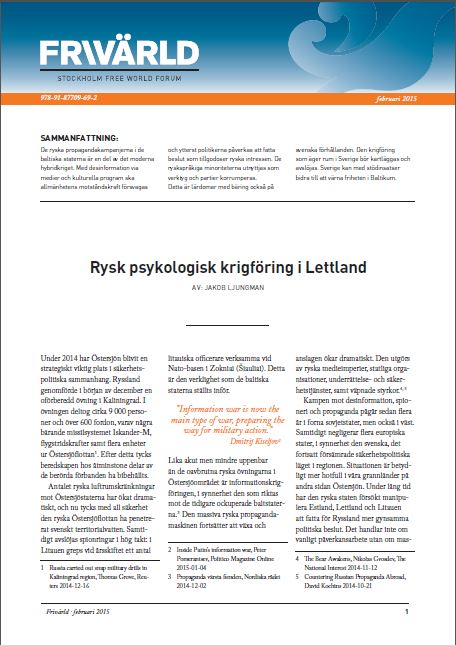Summary: Russia has long attempted a campaign of mainly non-military means in Latvia consisting of numerous strategies taking place both in the country and its surrounding areas. These campaigns must be viewed in light of the severe military escalation in the Baltic Sea and in Eastern Europe. An underlying problem is the rift between ethnic Latvians and ethnic Russians in the country, which is exacerbated by Russia’s aggressive rhetoric with regards to alleged human rights violations by Latvia towards the large Russian populace. These allegations are quite well-suited to go along with the traditional Russian anti-fascist narrative, which remains part the national political rhetoric even after the fall of the USSR.
Russian governmental organizations such as Russkiy Mir and Rossotrudnichestvo operate heavily in the Baltic states, perhaps most of all in Latvia, where roughly 28 percent of the population is ethnically Russian. These organizations support various cultural, educational and similarly related activities that instill what they consider to be “proper” values. There have been several occasions in which organizations supporting historical revisionism pertaining to the Soviet occupation from 1945 to 1991 have been funded by Russkiy Mir – essentially erasing the brutalities that occurred during that time. A key issue regarding subsidized organizations is that the receipt of funds requires entering into confidentiality agreements with Russkiy Mir concerning financial transactions, making it a difficult process to determine the exact amount of financial support each organization receives.
Probably the most well-known issue is the problem of Russian propaganda and information warfare that involves mass media, social media and governmental institutions. Due to several factors, mainly a lack of education in Latvian or English, ethnic Russians in Latvia are prone to watching only Russian-speaking television programs, which are still the main medium of information. Moreover, due to the development of state-controlled media with high-quality visuals in the Russian information sphere, viewers in Latvia today must choose between more visually attractive Russian programming and less attractive Latvian programs. Russian-language viewers are thus integrated into the Russian sphere of influence, widening the ethnic rift and leading to dramatically different world views along ethnic lines that can be used for malevolent political purposes. Ties that bind some elites in Latvia to those of Russia’s government or oligarchy are also reason for concern because Latvia is rather dependent on good trade relations with Russia. In recent years, however, there have been worries that some Russian investments can be used to disrupt Latvian businesses or economic sectors. Simply put, the Russian business networks and its elites are too intertwined with political leaders. The relatively fragile party political structure makes foreign influence a real threat. Harmony, Latvia’s largest pro-Russian party, has been funded by United Russia who has allegedly provided propaganda education to Harmony officials.
Latvia has three concerns that should be addressed swiftly:
- Financial transactions from Russian state-governed organizations to interest groups and similar groups in Latvia have been used to fuel ethnic and political tensions in recent years. There is little doubt that, if this is allowed to continue while the political situation deteriorates, these tensions will be used to threaten Latvian unity.
- Disinformation and propaganda must be combated with democratically sound means without disturbing the free flow of information. Integrating ethnic Russians into the Latvian or Western spheres of information is key to a more politically stable Latvia.
- Despite this gloomy picture, ethnic lines are losing significance and have been doing so for a long time. Claiming that there are severe tensions is part of the Russian narrative. Russian lies and disinformation about human rights violations and maltreatment of large population segments must be forcefully addressed.
For Sweden, Russia’s continued psychological warfare against Latvia and the other Baltic states has the following implications:
- As noted initially, the non-military campaigns must be viewed in light of the increased military activity in the Baltic Sea. The credibility of our defense and security policy currently hinges on our ability to ensure the safety of ourselves and our neighbors in accordance with the 2009 Declaration of Solidarity. Closer military cooperation with the Baltic States – and thereby with NATO – is the only way Sweden will be able to actually fulfill any obligations.
- International and information flows concerning Sweden must be analyzed continually. The media must be aware of reflexive control – the possibility that they are being used by a foreign power to affect decisions at home. Organizations such as the pro-Novorossiya “Donbass associations”, despite being fringe movements, should be monitored carefully for foreign influence.
- Sweden should support propositions such as the one put forth by the UK, Estonia, Denmark and Lithuania in the EU that supports taking international measures against the Russian information war. The need for such action is urgent, having seen the dangerous effects of disinformation pertaining to the Russian annexation of Crimea and war in the Donbass.
 Jakob Ljungman has a bachelor’s degree in political science from Lund University and is interested primarily in propaganda’s role in modern warfare. He has previously interned at Sweden’s embassy in Lithuania and worked in the Swedish Armed Forces. In 2014 Jakob wrote the report “Russia’s Information War In Lithuania” for the Stockholm Free World Forum.
Jakob Ljungman has a bachelor’s degree in political science from Lund University and is interested primarily in propaganda’s role in modern warfare. He has previously interned at Sweden’s embassy in Lithuania and worked in the Swedish Armed Forces. In 2014 Jakob wrote the report “Russia’s Information War In Lithuania” for the Stockholm Free World Forum.
